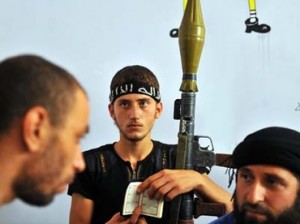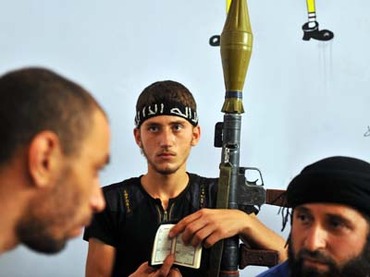
Damascus (AFP) – Rebels seized a major oilfield and shot down a warplane in eastern Syria Sunday, a watchdog said, notching up new battlefield successes even as the main opposition met in Qatar under US pressure for a makeover.
The rebel advances in the eastern province of Deir Ezzor came as their positions were pounded by warplanes in Damascus province and in the northern city of Aleppo, theatre of intense fighting with regime forces since mid-July.
State media, meanwhile, reported that a blast shook the area near the Dama Rose hotel in the heart of Damascus, wounding 11 civilians. It blamed the explosion on “terrorists” – the regime’s term for armed rebels.
The Dama Rose hotel hosted UN-Arab League envoy Lakhdar Brahimi during his visits to Damascus. The office of the Ombudsman, headed by diplomat Mokhtar Lamani, is also there.
The Syrian Observatory for Human Rights said the seizure of the eastern oilfield marked a first by the opposition since the revolt against President Bashar Al-Assad’s regime erupted in March last year.
“Rebels in the Jaafar Tayyar Brigade took control of Al-Ward oilfield, east of the town of Mayadin, after a siege that lasted several days,” the Britain-based watchdog said.
“This is the first time the rebels have taken control of an oilfield,” Observatory director Rami Abdel Rahman told AFP by phone.
The fighting on Sunday began at dawn and lasted several hours, said Abdel Rahman, adding that 40 soldiers guarding the facility were either killed, wounded or taken prisoner.
The Observatory later announced rebels in Deir Ezzor had shot down a warplane, citing local witnesses.
The group, which gathers its information from a nationwide network of activists, lawyers and medics in civilian and military hospitals, said initial reports indicated the pilot had been captured.
Fighting also erupted near a political intelligence office in Damascus province at dawn, the Observatory said, adding that warplanes later carried out three raids on the Ghuta region some 50 kilometres (30 miles) northeast of the capital.
The escalating conflict and ever-rising death toll added urgency to a meeting of the opposition Syrian National Council in the Qatari capital Doha, with the United States reportedly pressing for a new umbrella organisation to unite the country’s fractured regime opponents.
According to the reports, which emerged after US Secretary of State Hillary Clinton charged that the SNC was not representative, long-time dissident Riad Seif is touted as the potential head of a new government-in-exile dubbed the Syrian National Initiative.
But as the Doha meeting got under way, Seif denied he planned to head a government in exile.
“I shall not be a candidate to lead a government in exile… I am 66 and have health problems,” he told reporters.
At the meeting’s opening ceremony, SNC chief Abdel Basset Sayda denounced what he called “efforts to bypass the SNC and numerous attempts to find substitutes” for the group, though he recognised that some of the criticisms levelled against it are “founded.”
The SNC lashed out on Friday at alleged US interference in the opposition, accusing Washington of undermining the revolt and “sowing the seeds of division” by seeking its overhaul.
Clinton has voiced frustration with the SNC, calling it unrepresentative of on-the-ground opposition forces and saying it “can no longer be viewed as the visible leader of the opposition.”
In his remarks, Sayda also argued that military action against the regime must be “organised and unified,” so that the various military groups battling the regime can form the “core of the next Syrian army.”
The Observatory says more than 36,000 people have died since the uprising against Assad’s rule broke out in March 2011, first as a protest movement inspired by the Arab Spring and then as an armed rebellion after brutal repression by the regime.


